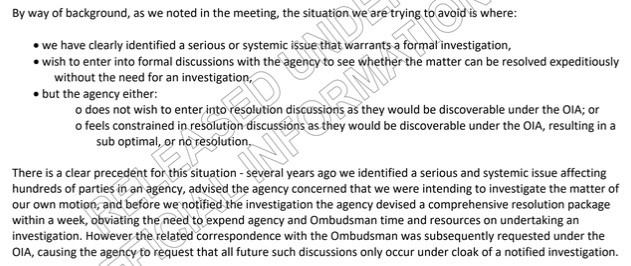The government is trying to "reform" Oranga Tamariki, and has a bill before the House to do so: the Oversight of Oranga Tamariki System and Children and Young People’s Commission Bill. Submissions on the Bill close next Wednesday, and children's rights campaigners are horrified by it - and in particular by the way it will replace the statutorily independent Children's Commissioner with a subservient Children and Young Person's Commission. I guess fierce and independent advocacy is not what the government thinks children - particularly children in its care, and who may be abused there - need.
My interest in the bill is mostly on its multiple secrecy clauses. I've been able to excavate some of the policy background to these using the OIA, and they seem even less justifiable as a result. The first of these excludes non-investigation-related communications with the Ombudsman about Oranga Tamariki issues from the OIA (communications around formal investigations are already exempt). What situation is this supposed to prevent? The Ombudsman helpfully provided one:
Note that the underlying situation, whatever is going wrong, would still be OIA-able; the amendment is aimed at making it harder to find by preventing journalists and advocacy groups from taking the shortcut of "so, what has the Ombudsman asked you to fix" (with the obvious followup of "and have you actually fixed it?"): this is about hiding dirty laundry, not about actually fixing anything. And the primary drivers here are the Ombudsman's preference for quick, informal resolution, and the desire of agencies to avoid embarrassment and public oversight. Its about bureaucratic arse-covering and a chummy desire to get along by covering for each other, not child-welfare. For the Ombudsman to be advocating for secrecy for such reasons is frankly disgusting, and calls into question their fitness to oversee the official information system.
Bluntly, if agencies are reluctant to cooperate with the Ombudsman, then the Ombudsman has the necessary powers to deal with that, and the solution is for them to start fucking using them (also to publicise non-cooperation to encourage compliance). Its a criminal offence not to cooperate with an Ombudsman's investigation or refuse their request for information, and those provisions should be used. The Ombudsman is not there to "get along" with government agencies; they are there to police them, and it is time they started acting like it.
Then there's the new secrecy clause for the Children and Young Person's Commission. The official reason for this is to enable children to engage with the Commission:
Which sounds like a good reason, but falls apart when you stop to think about it. If a child makes a complaint to the police, the details will be fully subject to the OIA. There may be good reason to withhold them ("maintenance of the law" if it is being prosecuted, plus obviously privacy), but the presumption is that the information is subject to the law. And that's fine, because the privacy interests of children are very strong, and the OIA provides sufficient protection. Does the government think the new Commission will fail to apply OIA withholding grounds sufficiently vigorously to protect children, or that the Ombudsman will ignore the strong privacy interest of children in deciding any complaint? Its a ridiculous idea. So who and what does the secrecy clause actually protect? The agencies being complained about. And they seem to be unworthy of any protection whatsoever; in fact, there is a strong public interest in poor government behaviour being exposed. And once again, if this is a question of "engagement", the Commission will have the required powers to force disclosure. But I guess the whole point is that the new, subservient Commission isn't really meant to inquire into anything...
One of the purposes of transparency is to make it easier for the public to find and correct abuses by government. The new secrecy laws in this bill work directly against that. And when the welfare of children is on the line, the consequences can be horrific. The government is currently conducting an inquiry into decades of abuse in care. Changing the law to make it easier for the government to hide its dirty laundry seems like a recipe for another such inquiry in a few decades' time.





